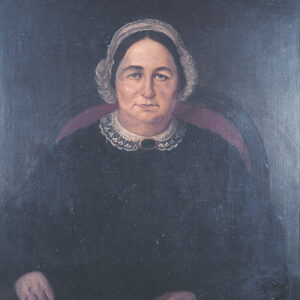calsfoundation@cals.org
Abraham Block (1780?–1857)
aka: Abraham Bloch
Abraham Block was the patriarch of the first documented Jewish family to immigrate to the state of Arkansas. After a period as a businessman in Virginia, Block moved his family to southwest Arkansas in search of new economic opportunities. Along with his sons, he created a regional merchant empire with businesses in Washington (Hempstead County), Fulton (Hempstead County), and Paraclifta (Sevier County) in Arkansas, as well as in New Orleans, Louisiana, and at several stops along the railroad in Texas from Houston to Dallas. The family home in Washington has been restored and is currently a house museum in Historic Washington State Park.
Abraham Block (or Bloch) was born on January 30, 1780, or 1781, in Schwihau, Bohemia. The names of his parents are unknown, and little is known of his years in Bohemia. Around the age of twelve, Block immigrated to Richmond, Virginia. He likely traveled to the United States with an older relative or came to live with relatives already in America; these familial relationships, however, are unknown. Block served in the War of 1812 in the Richmond Light Infantry Blues, earning the title of captain.
On October 2, 1811, Block married fifteen-year-old Frances “Fanny” Isaacs. Her lineage as a colonial Sephardic Jew and Block’s Ashkenazim origins made their union somewhat of a mixed marriage, though Block’s business prospects likely contributed to the approval of the marriage by her Sephardic relatives. The couple had fourteen children, with twelve living to adulthood.
In 1823, Block began to liquidate property inherited from his father-in-law and began the process of moving the family westward toward Arkansas. This move was probably brought about by limited economic opportunities in the city of Richmond, as well as the influx of capital from his wife’s inheritance. While Fanny was pregnant with the couple’s seventh child, Block left for New Orleans to begin establishing economic ties to the area. By 1825, he had started a business in the Arkansas town of Washington and summoned his family west. With seven young children in tow, Fanny left for Arkansas via New Orleans in 1826. As was family custom, she and the children did not join Block in Washington until a suitable house was built in 1827.
Although the Blocks had strong ties to the Jewish community in New Orleans, they were unable to attract others in that community to join them in Washington. As a result, their only connections to the broader American Jewish community were periodicals and occasional business trips to New Orleans. This lack of community did not, however, diminish the Blocks’ ties to the Jewish faith. When the first congregation, Shangrai Chesed (“Gates of Mercy”), formed in New Orleans in 1827, Block joined as a founding member. This limited contact with other Jews did, however, restrict the manner in which the Blocks practiced their faith in the home. As a consequence of their religious isolation in Arkansas, the family did not keep kosher, and the majority of the Block children married and left the faith.
Block officially retired from the family business in 1850 and died unexpectedly on an annual visit to New Orleans on March 17, 1857. He is buried at the Dispersed of Judah congregation cemetery in New Orleans. The significance of the Block family on the growth of Arkansas Judaism cannot be understated. The Blocks established a “chain store” business that set the precedent for future generations of Jewish businessmen in the state.
For additional information:
Abraham Block Research Collection. Butler Center for Arkansas Studies. Central Arkansas Library System, Little Rock, Arkansas. Finding aid online at https://cdm15728.contentdm.oclc.org/digital/collection/findingaids/id/8766/rec/1 (accessed December 18, 2023).
Historic Washington State Park. http://www.historicwashingtonstatepark.com/ (accessed February 9, 2022).
Kwas, Mary L. Digging for History at Old Washington. Fayetteville: University of Arkansas Press, 2009.
———. “Two Generations of the Abraham and Fanny Block Family: Internal Migration, Economics, Family and the Jewish Frontier.” Southern Jewish History 12 (2009): 39–114.
LeMaster, Carolyn Gray. A Corner of the Tapestry: A History of the Jewish Experience in Arkansas, 1820s–1990s. Fayetteville: University of Arkansas Press, 1994.
David M. Markus
University of Arkansas, Fayetteville
 Louisiana Purchase through Early Statehood, 1803 through 1860
Louisiana Purchase through Early Statehood, 1803 through 1860 Abraham Block
Abraham Block  Fanny Block
Fanny Block 




My father Clarence Ezekiel Block often mentioned Abraham Block. We are African American, and are apparently descendants of Mr. Abraham Block.
He owned many slaves and it is well known by our family that we were enslaved under his ownership. I have successfully dated my family back to the late 1800s. I am one or two family members away from making the connection.
I believe I am a descendant of Abraham Block on my mother’s side. They were from the Fulton/Hope area of Arkansas. Also, my great-grandmother was Valerie Block, buried in Fulton.
I am a direct descendant of Abraham Block by way of his son David Block. David Block had a slave named Sophia, with whom he had children. William Block was one of these children–named Leroy–who was my grandfather Tennyson Block’s father.
Just wanted to share that little bit of my family history.
I’m interested in learning more about Abraham Block. I’m 51 years old and my grandfather Clarence Eziekel Block spoke of Abraham Block as being a relative of mine.